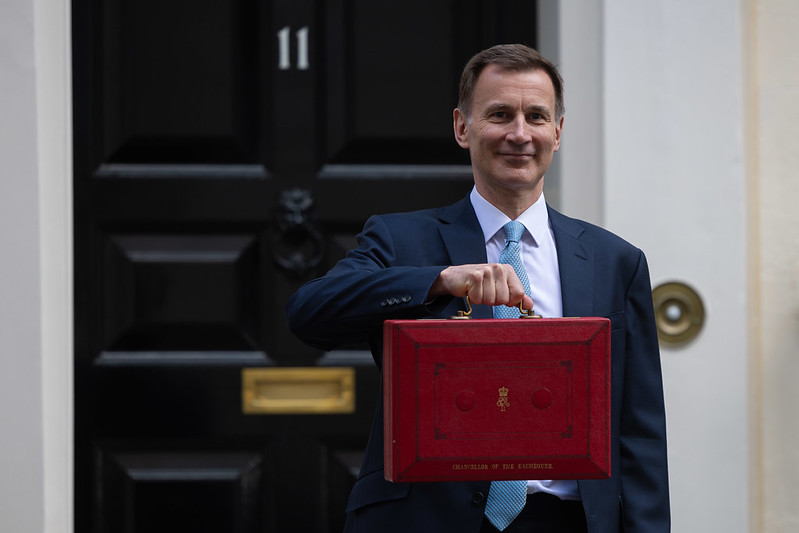Budget 2024 draws mixed response from industry

Chancellor Jeremy Hunt’s trip to the despatch box to deliver the 2024 Spring Budget to parliament is being seen as little more than tinkering around the edges, from industry.
The Food and Drink Federation CEO, Karen Betts said it was great to see the Chancellor’s acknowledgement of the impact of inflation on households with his cut to National Insurance. Yet she noted how the food and drink manufacturing sector continues to keep prices as low as possible, conscious that many families’ budgets are now close to breaking point.
“But the costs of recent turbulence to our sector are real, and are illustrated in stark terms by a steep fall in investment in food and drink manufacturing, which declined by a third last year compared to 2019,” Betts added.
The country needs a strong food and drink sector – which underpins food security, as well as hundreds of thousands of jobs and forward-looking science and innovation.
“For this we need joined-up, constructive government policies to shore up our strength and to create the conditions for investment,” Betts explained. “This was in short supply in this Budget. Instead, our sector is still held back by a muddle of poor regulation – the latest example of which is ‘Not for EU’ labelling, which will have a chilling effect on investment and exports while tying UK food labelling once again to EU rules.”
Following the Spring Budget, Scott Dixon, managing director for The Flava People believes the changes for SMEs haven’t gone far enough.
While there is no silver bullet when it comes to growth, he says the country needs policies to better incentivise growth.
“Not just investment for big business, but incentivise productivity, incentivise people getting back to work, and to incentivise businesses to set up shop, sell, and acquire in the UK,” Dixon clarified.
“SMEs account for 99.9% of businesses in the UK and an estimated £2.4 trillion in turnover, an astonishing stat and yet so many policies are aimed at or tailor to big business. An example of this was seen today, as the Chancellor’s focus continues in creating opportunity for companies like Nissan, Google and Microsoft.
Dixon did acknowledge positive changes in the Budget: the increase in threshold for VAT registration to £90,000; the freeze on fuel duty to help those who have their own vehicle fleets; and the changes to the childcare benefits and National Insurance will encourage more people back into the workforce.
“But as a country we need to go further in order to encourage entrepreneurs and business leaders so go further and invest more,” Dixon continued. “Reduction in corporate tax, or capital gains tax for businesses, would have gone a long way to help SMEs, giving people the space and the incentive to invest and scale in the UK.”
In analysing the wider manufacturing sector, Andrew England, tax partner and manufacturing sector specialist from the consultancy and accountancy Menzies LLP said the Spring Budget included little in the way of tax announcements that directly impact on the manufacturing sector but the rhetoric around a focus on productivity and commitments to advanced manufacturing and life sciences are positive statements as the UK seeks to drive its international competitiveness although the extent to which the non-domicile changes will detract from this when attracting international talent is difficult to assess at this stage.
According to England, the lack of skilled labour impacts on productivity and the competitiveness of the UK manufacturing sector and with this in mind the £50m Apprenticeship Growth Sector pilot for advanced manufacturing is a positive step but more focus is needed to drive the link between the education sector and the sector to highlight the breadth of opportunity in the sector and to reduce the skills gap and more collaboration between industry and the sector would be welcomed.
Anna Taylor, executive director of The Food Foundation was more scathing in her assessment, saying the Budget failed to offer support to families still in food insecurity and are unable to afford the food they need to live healthily.
In highlighting the Spring Budget’s failings, Taylor conclusions are:
- Free school meals: policy makers should invest in offering Free School Meals to all children, starting with all children from households on Universal Credit.
- Benefit and wage levels: there needs to be a review of current levels of benefits and the living wage to ensure they cover the cost of a healthy and sustainable diet.
- Expansion of the soft drinks industry levy: Building on its success by expanding the levy onto sugar and salt in food to raise money to be invested in children’s health.
Related content
Source: foodanddrinktechnology.com

